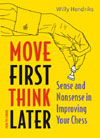
Move first think later by Willy
Hendriks
2012
New in Chess
http://www.newinchess.com/
254 pages
Price € 23,95
ISBN:
978-90-5691-398-4
The strong candidate grandmaster Willy Hendriks comes with a impressive
no-nonsense training manual, often based on latest scientific insights.
Of course there are chess exercises to test our skills but this book is
not overloaded with it,
no it holds more a wealth of instructive advises.
For example” Nowadays, virtually no one will deny that our chess
playing depends largely upon the knowledge stored in our memory.
Through a process of recognizing similarities, this knowledge is
activated as soon we start looking at a position.
But isn’t this only half of the picture, the other half being our
active intelligence, putting to work all our wisdom, strategic
knowledge,
understanding, calculation and assessment, to distill the best move out
of raw material bubbling up out of our brains?
Hendriks also writes: In our brain ,different parts have different
functions. In the past a lot of knowledge about this has been
gathered by
studying patients with different kinds of brain damage. Nowadays, more
sophisticated ways have become available to investigate this.
There is quite a bit of knowledge about which parts are involved in
which function,for example language, or controlling your heartbeat.
So we can tell with some certainty where our chess playing capacities
are located. Neurobiology and neurosurgery are advancing to a more
microscopic level like stimulating a very minor piece of a patient’s
brain and thereby provoking some old schooldays memory or making him
hum a tune.
The Dutch Nestor Hans Bouwmeester has claimed that the multitude of
masters and grandmasters these days could be described as inflation
,but
Hendriks does not agree with this, because there are really far more
strong players than fifty years ago.
But to get the maximum out of your talent, hours of training have to be
spent, and a good start is this incredible work from Willy Hendriks!
Conclusion: One of the best
training
manuals I ever had in hand!
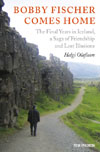 Bobby Fischer comes
home by Helgi Olafsson
2012
New in Chess
Bobby Fischer comes
home by Helgi Olafsson
2012
New in Chess
http://www.newinchess.com/
142 pages
Price € 17,95
ISBN:
978-90-5691-381-6
Grandmaster Helgi Olafsson {1956} descries in this book his
friendship
with the chess genius Bobby Fischer,who became a man with nearly no
friends at all.
Helgi Olafsson describes in this book his ups and downs with the chess
legend Fischer but this lovely made book is truly overloaded with
readable
Fischer material,as for example Olafsson includes a unique inside view
of the 1972 world championship match, yes Helgi Olafsson was
there in 1972 and he
writes:”Even through I was a complete nobody I remember how respectful
these two grandmasters {Kavalek and Larsen}were towards some of my
suggestions”.
Later on he writes in the book: “During dinner Bobby and Boris
discussed some games from the 1972 match. Some of your moves Boris were
really terrible. Bobby
said, and pointed out specially the horrific blunder in the 14th game,
when with an unexplainable pawn push on move 27 he threw away his
winning chances in a
highly promising position”.
Interesting are the words from Olafsson on Bobby Fischer” "It almost
felt like the game of chess was too easy for him. His calculating
abilities were great. It is difficult to describe this, but it Seemed
that he somehow had a different calculating method than most chess
players”,
All sorts of people wanted to meet Bobby Fischer in the first days and
weeks after his arrival in Iceland, and Bobby would talk freely to
almost anyone.
A Canadian friend of his very much wanted Bobby to autography a copy of
My 60 Memorable Games.When I spoke with Bobby he was readily
willing to sign the book.But he refused to sign the Faber &
Faber copy I had brought him.
It has to be a Simon and Schuster,he said. I didn’t feel like asking
him for the reason, but I knew the original publisher had been Simon
and Schuster.
Bobby Fischer comes home is a very personal account on maybe the
greatest chess player of all time.
Included throw the book are some very rare and seldom seen photographs.
Conclusion: Very touching!
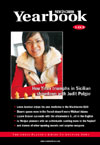 New in Chess
Yearbook
issue 103
2012
New in Chess
New in Chess
Yearbook
issue 103
2012
New in Chess
http://www.newinchess.com/
206 pages
Price € 26,95
ISBN:
978-90-5691-391-5
In forum you will find contributions from readers all over the world as
the small contribution from Sagar Dharmendra Shah on
the Fantasy Variation of the Caro-Kann: 1.e4 c6 2.d4 d5 3.f3 dxe4
4.fxe4 e5!?
But there is more as Benjamin’s Opening Takes,Kuzmin’s Harvest and 28
smashing openings surveys!
As for example the one from Rene Olthof on the Najdorf with1.e4 c5
2.Nf3 d6 3.d4 cxd4 4.Nxd4 Nf6 5.Nc3 a6 6.Bg5 e6 7.f4 Be7 8.Qf3 Qc7
9.0-0-0 Nbd7 10.g4 b5 11.Bxf6 Nxf6 12.g5 Nd7 13.f5 or the contribution
from A.C van der Tak on the Fritz Variation: 1.e4 e5 2.Nf3 Nc6
3.Bc4 Nf6 4.Ng5 d5 5.exd5 Nd4 6.c3 b5 7.Bf1 Nxd5 and now the move 8.Ne4
Ne6 9.Bxb5+ Bd7 10.Bc4 is an interesting possibility but as
from the Tak writes:but it’s not clear how strong this move really is.
A other fine gambit contribution comes from Andras Adorjan and Endre
Vegh with a special contribution by Felix Izeta:1.e4 c6 2.d4 d5 3.f3 e5!
And fun is the contribution from Alexander Raetsky and Maxim Chetverik
1.e4 e6 2.d4 d5 3.Nc3 Bb4 4.e5 c5 5.Qg4!
Both authors write it is not seriously suggested that the 24 wins for
white in this variation refute the French Defence.Neverless,5.Qg4 is
suitable
not only against children and amateurs.
Conclusion: These yearbooks are
extremely useful for prepartion!
Capablanca move by
move by Cyrus Lakdawala
2012
Everyman
Chess
http://www.everymanchess.com
364 pages
Price € 24,95
ISBN 978-1-85744-698-2
José Raúl Capablanca was one of the greatest player of
all time,higly rewarded for his excellent endgame skills.
Seen his excellent game skills he was nick named the "Human Chess
Machine".
Emanuel Lasker once said: "I have known many chess players, but only
one chess genius: Capablanca."
Cyrus Lakdawala holds in this move to move book, a collection of 54
Capablanca’s best games.
Lakdawala writes:Capablanca certainly had all the necessary
requirements of a great attacker: Intuition, positional build-up skills
two generation
ahead of his rivals, a perfect sense of timing, and unrivalled
combinational skills, especially in short range calculation.
If this temperament were different and he didn’t fear a loss to such a
high degree, Capa could have been another Morphy,tal or Alekhine.
Game one holds a King’s Gambit and Capablanca was only thirteen years
old:
Corzo y Prinzipe,Juan - Capablanca,Jose Raul [C25]
Havana m Havana (8), 1901
1.e4 e5 2.Nc3 Nc6 3.f4 exf4 4.Nf3 g5 5.h4 g4 6.Ng5 h6 7.Nxf7 Kxf7 8.d4
d5 9.exd5 Qe7+ 10.Kf2 g3+! 11.Kg1 Nxd4 12.Qxd4 Qc5
13.Ne2 Qb6 14.Qxb6 axb6 15.Nd4 Bc5 16.c3 Ra4 17.Be2 Bxd4+ 18.cxd4
Rxd4 19.b3 Nf6 20.Bb2 Rd2 21.Bh5+ Nxh5 22.Bxh8 f3
23.gxf3 Nf4 24.Be5 Rg2+ 25.Kf1 Rf2+ 26.Ke1 Nd3+ 0-1.
Corzo’s attempted improvement over his unsound 10.Be2? f3 11.gxf3 gxf3
12.0-0 Qxh4,which gave Capa a winning position in the sixth
game, although he botched it and only drew. Capablanca writes:”Corzo
analysed the position and told someone that he should have played
10.Kf2.When I heard this I analysed the situation myself and decided to
play it again, as I thought that Black should win the continuation
that I put in practice in this game.”Very sneaky! So the prodigy went
home and began studying the position and came up with a fantastic idea
in his home prep.
All material is divided into four chapters:Capa on the Attack,Capa on
Defence,Capa on exploiting imbalances,Capa on accumulating advantages
and Capa on Endings.
Conclusion:Marvelous work on
Capablanca!
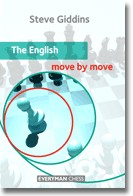 The English move by
move by Steve Giddins
2012
Everyman
Chess
The English move by
move by Steve Giddins
2012
Everyman
Chess
http://www.everymanchess.com
268 pages
Price € 23,95
ISBN 978-1-85744-699-9
Steve Giddins provides the read with a wealth of move to move
annotations in the English Opening where he goes for all kind of
lines as: 1.c4 e5 lines,1.c4 c5 lines,The Mikenas System 1.c4 Nf6 2.Nc3
e6 3.e4,Anti-Slav and Hedgehog Lines,Anti Grünfeld,King’s Indian
and Dutch lines plus a whole extra chapter to help you to build a
repertoire.
All material is explained at the hand of 26 heavy loaded model games.
Included here is the latest game Timman Ernst,Wijk aan Zee 2012!
A old analyse from Taimanov runs with the moves: 1.c4 Nf6 2.Nc3 e5
3.Nf3 Nc6 4.e4 Bb4 5.d3 d6 6.g3 0-0 7.Bg2 Bxc3+ 8.bxc3 Ne8
9.0-0 f5 as equal but Giddins writes:
And this has been accepted a virtually the main line.However,I have
never understood this.
Black first surrenders the bishop pair,in the process vovering white’s
weakness on d4 and opening the b file for him,and
then follows up by opening the long white diagonal of the English
bishop! It is hard to believe that this can really
equalize,and after 10.Bg5 Nf6 11.exf5 Bxf5 12.Nh4 Be6 13.Rb1 followed
by Qd2 and a later f4,white should be better.
Conclusion: One of those Steve Giddins super reads!
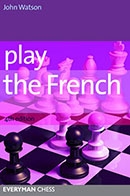
Play the French by John Watson
2012
Everyman
Chess
http://www.everymanchess.com
432 pages
Price € 24,95
ISBN 978-1-85744-680-7
Nine
years after the publication of Play the French 3rd edition IM John
Watson is back with a impressive revised and updated 4th edition
of his
French repertoire book, which has gone from 272 pages to a heavy weight
from 432 pages!
In the mainline of the Advance there is now a brand new chapter on the
move 1.e4 e6 2.d4 d5 3.e5 c5 4.c3 Nc6 5.Nf3 Nh6,plus a brand
new chapter on the Portisch Hook Variation 1.e4 e6 2.d4 d5 3.Nc3 Bb4
4.e5 c5 5.a3 Bxc3 6.bxc3 Qa5.
But the best of all is that Watson has returned to his old love the
move 3….Nf6 against the Tarrasch.
Watson writes: I have returned to 3…Nf6,not only on the basis of proven
merit but also very little, if anything has changed in a fundamental
sense in the 3…c5 lines.
And Watson has returned to the Winawer Poisoned Pawn in the main 7.Qg4
line,plus there are two new chapters on the MacCutcheon Variation.
Watson speaks of a refutation in the Milner Barry main line with his
1.e4 e6 2.d4 d5 3.e5 c5 4.c3 Nc6 5.Nf3 Qb6 6.Bd3 cxd4
7.cxd4 Bd7 8.0-0 Nxd4 9.Nxd4 Qxd4 10.Nc3 a6 11.Qe2 Ne7 12.Kh1 Nc6 13.f4
Nb4 14.Rd1 Bc5!
Watson writes: The first point is that Black threatens 15…Nxd3
16.Qxd3{[16.Rxd3?? Qg1 mate}16…Qxd3 with a clear pawn up.As far as I
can tell,white can never equalize.
Interesting enough,Watson preferred in his 3rd edition 13…Bc5.
In the MacCutcheon Watson goes for the move order with 8….g6 and
the reader shall find lines as
1.e4 e6 2.d4 d5 3.Nc3 Nf6 4.Bg5 Bb4 5.e5 h6 6.Bd2 Bxc3 7.bxc3 Ne4 8.Qg4
g6 9.Bd3 Nxd2 10.Kxd2 c5 11.h4 Nc6 12.Nf3 c4
13.Be2 Bd7 14.Qf4 Qe7 and after 15.Qf6 we reach a classic game from
Korchnoi from the 1950s.
Conclusion: Unbelievable update!
The Dangerfield
Attack, David Rudel
2012
Thinkers Press
167 pages
Price €14,99
ISBN 1-888710-59-4
David Rudel provides the reader with a complete repertoire for
white against the Dutch Defence,it does not matter what black
plays,Rudel moves
his white bishop to f4.
For example against the Stonewall he goes for lines as 1.d4 e6 2.Nf3 f5
3.Bf4 Nf6 4.e3 d5 5.c4 c6 6.Nc3 Be7 7.Bd3 0-0 8.Qc2 Ne4 9.g4 Qa5
and now Rudel his novelty 10.a3.
The Leningrad players have to take care after 1.d4 f5 2.Bf4 Nf6 3.e3 g6
4.h4 Bg7 5.h5 Nxh5 6.Rxh5 gxh5 7.Qxh5+ Kf8 8.Qxf5+ Kg8
9.Nc3 e6 10.Qh5 d6 11.0-0-0 Nd7 12.Bg5 Nf6 13.Qf3 and white has afyer
Rudel natural ways of increasing his piece pressure against black’s
king.
In the Fianchetto you can find lines as 1.d4 f5 2.Bf4 Nf6 3.e3 e6 4.Nf3
b6 5.a3 Bb7 6.Nc3 a6 7.h4 Bd6 8.Ne5 0-0
9.Be2 Be7 10.Bf3 Qc8 11.Bg5 Re8 and after Rudel black cannot
advantageously transform the position.
Interesting to mention is the good old Krauser Variation,named after
Orla Hermann Krause a contemporary of
Nimzowitsch 1.d4 f5 2.Bf4 Nf6 3.e3 d6 4.Nf3 Nc6 5.c4 h6 6.Nc3 g5 7.Bg3
e6 8.Bd3 Bg7 9.d5 Ne7 10.dxe6 Bxe6 11.Nd4 Bd7 12.Qb3 and the black king
has no longer a safe place.
Conclusion: All Dutch players have to fear this book!
Zuka by David Rudel
2012
Thinkers Press
440 pages
Price €28,95
ISBN 1-888710-63-2
First of all this
brand-new repertoire book from David Rudel holds the entire above
mentioned work of the Dangerfield Attack.
Again Rudel comes with a bright repertoire book where he intends
moves as 2.c4 and Nf3.
At the King’s Indian Rudel prefers lines that are related to the
‘dreaded’ Exchange Variation, but take care here slight differences
which give white in no time better play.
For example: 1.d4 Nf6 2.Nf3 g6 3.c4 Bg7 4.e3 d6 5.Nc3 0-0 6.Be2 Nbd7
7.0-0 Re8 8.Qc2 e5 9.dxe5 dxe5 10.e4 c6 11.Be3 Bf8 12.h3 Qc7 13.Rfd1 b6
14.a3 Nc5 15.b4 Ne6 16.Rac1 Nd7 17.Qb3 Bb7 18.Nb5 cxb5 19.cxb5 Ndc5
20.bxc5 bxc5 21.Ng5 Nxg5 22.Bxg5 Bxe4 23.Bg4 Bd6 24.Qc4 Bb7 25.Rd2 is a
living nightmare for black!
Against the Grünfeld same story,again some sneaky moves as 1.d4
Nf6 2.Nf3 g6 3.c4 Bg7 4.e3 d5 5.cxd5 Nxd5 6.e4 Nb6 7.a4!
Rudel explains in this book”The Zuka repertoire out lines in this
balanced between objective {theoretic}advantage and subjective
{practical} advantage.
Strong for black is after Rudel 1.d4 Nf6 2.Nf3 g6 3.c4 Bg7 4.e3 0-0
5.Be2 c5!
Recommended by IM Dembo in Fighting the Anti-King’s Indian, but Rudel
has a surprise for us he plays The Shrewed 1.d4 Nf6 2.Nf3 g6 3.c4 Bg7
4.e3 0-0 5.h3!
Going throw this book I was surprised about the quality of the moves
for example in the Old Indian and other ..d6 Defences,here no moving
around with e3 but decent lines as
1.d4 d6 2.Nf3 Nf6 3.c4 Nbd7 4.Nc3 e5 5.e4 Be7 6.Be2 0-0 7.0-0 c6 8.Qc2
a6 9.h3 Qc7 10.Be3 b5 11.a3 Bb7 12.Rfd1 Rac8 13.Rac1 Qb8 14.b4,where
white’s last move is a impressive novelty.
We have here a book that many black players shall fear!
Conclusion: One of those dangerous
repertoire books!
Playing
1.d4 - The Queen's Gambit by Lars Schandorff
Quality Chess
304 pages
Price €24,99
ISBN 978-1-907982-31-6
Playing 1.d4 is a impressive move to move
repertoire openings book based on the Queens’s Gambit Declined 1.d4 d5
2.c4 e6 3.Nc3 Nf6,Queen’s Gambit Accepted
1.d4 d5 2.c4,The Slav 1.d4 d5 2.c4 c6 3.Nf3 Nf6 4.Nc3 dxc4 5.a4 Bf5,The
Semi Slav 1.d4 d5 2.c4 c6 3.Nf3 Nf6 4.Nc3 e6,The a6 Slav 1.d4 d5 2.c4
c6 3.Nf3 Nf6
4.Nc3 a6,Tarrasch 1.d4 d5 2.c4 e6 3.Nc3 c5 4.cxd5 exd5 5.Nf3 Nc6
6.g3,The Chigorin 1.d4 d5 2.c4 Nc6 and some minor lines after 1.d4 d5
2.c4.
For example I found here the Von Henning Schara Gambit where Lars
Schandorff did include the following model game: Illescas
Cordoba,Miguel (2635) -
Rodriguez Vargas,Orestes (2405) [D32] Catalunya-chT Catalunya, 1996
1.d4 d5 2.c4 e6 3.Nc3 c5 4.cxd5 cxd4 5.Qa4+ Bd7 6.Qxd4 exd5 7.Qxd5 Nc6
8.Nf3 Nf6 9.Qd1 Bc5 10.e3 Qe7 11.Be2 g5 12.0-0 0-0-0 13.b4 Bxb4
14.Bb2 g4 15.Nd4 Kb8 16.Ncb5 Ne5 17.Qb3 Rhg8 18.Rab1 Bc8 19.Nxa7 Ne4
20.Ndc6+ 1-0,interesting are the words from Schandorff
writes:”Johnny Hector,the Swedish fighter with the mythological
name,has been experimenting with 11…g5!? 12.0-0 g4 13.Nd4 Qe5 {13…h5
14.b4},but
after 14.Nxc6 Bxc6 white can get away with taking a second pawn with
15.Bxg4 and white has a large intiatief,at least my computer believes
so.
Included throw this book is a Hugh collection of 77 heavy loaded model
games,where many of them come from the correspondence world as the
following
attacking game from Sauberli:
Sauberli,Guy (2000) - Bilsel,Sabahaddin (TUR) (1948) [D20]
CL2-1999.31 IECC, 22.09.1999
1.d4 d5 2.c4 dxc4 3.e4 e5 4.Nf3 Bb4+ 5.Nc3 exd4 6.Nxd4 Ne7 7.Bxc4 Nbc6
8.Be3 0-0 9.Ndb5 Ba5 10.Qh5 a6 11.Rd1 Qe8 12.Nd4 Nxd4
13.Bxd4 Nc6 14.0-0 Be6 15.Bxg7 Kxg7 16.Qg5+ Kh8 17.Qf6+ Kg8 18.Nd5 Qd8
19.Qh6 f6 20.Rd3 Kh8 21.Rg3 Rf7 22.Nf4 Ne5 23.Bxe6
Qf8 24.Qh4 Rg7 25.Bf5 Qf7 26.Rh3 Re8 27.Rd1 c6 28.Nh5 Ng6 29.Qxf6 Qxf6
30.Nxf6 Ree7 31.Bxg6 Rxg6 32.e5 h6 33.f4 Kg7 34.g4 Bc7
35.Kg2 Bxe5 36.fxe5 Rxe5 37.Nh5+ Kf8 38.Rd8+ Ke7 39.Rhd3 Rd5 40.R8xd5
cxd5 41.Kf3 Rb6 42.Rb3 Rxb3+ 43.axb3 Ke6 44.Kf4 d4
45.Ke4 1-0, Schandorff writes:”White played a great attacking
game,but it does not bury the whole variation with 4…Bb4+.Black can and
probably should follow the expert Rublevsky’s example and take
the somewhat worse ending on move 10.
Conclusion: From experts for experts!
ChessBase Magazine
extra issue 148
July 2012
Videos by Andrian Mihalchishin & Valeri Lilov
ChessBase
http://www.chessbase.com
E-Mail
info@chessbase.com
ISSN 1432-8992
Euro 12.99
This issue is really well filed with 28.560 high class games,and
all played between April and June of this year.
The most games come from the Golden Sands Europe with 581 games.
Other super tournaments that are included: Moscow Tal Memorial
Blitz,won by Morozevich and Carlsen),Leon Masters 25th and
Wch Rapid (Women).
The excellent made multimedia files come from Valeri Lilov and Adrian
Mikhalchishin.
Conclusion: Super material for a
bargain price!
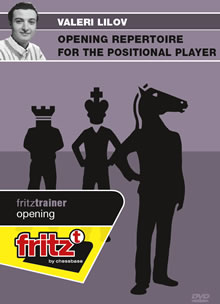 Opening Repertoire for
the Positional Player by Valeri Lilov
2012
Opening Repertoire for
the Positional Player by Valeri Lilov
2012
http://www.chessbase.com
E-Mail
info@chessbase.com
Euro 27,90
Pentium-Processor at 300 Mhz or higher, 64 MB RAM, Windows XP, Windows
Vista, Windows 7, DVD drive, mouse, soundcard.
Valeri Lilov offers the user of this DVD a complete repertoire
based on both sides of the board,where Lilov aim is safety.
Included in these four hours of enjoyable video time a scale of
entertaining positional chess lines as the English Defence with:
1.c4 e5
2.Nc3 Nc6 3.g3 Nf6 4.Bg2 g6 5.d3 Bg7 6.e3 0-0 7.Nge2 d6 8.0-0 Be6 9.Nd5
Nxd5 10.cxd5.
Or with 1.e4 he goes for the Four Knights Game: 1.e4 e5 2.Nf3 Nc6 3.Nc3
Nf6 4.Bb5 Bb4 5.0-0 0-0 6.d3 d6 7.Bg5 Bxc3 8.bxc3 Qe7
9.Re1 Nd8 10.d4 Ne6 11.Bc1 c5 12.a4 Rd8 13.Bf1 cxd4 14.cxd4.
But Lilov his lines may not be under rested as we see in the Pirc: 1.e4
d6 2.d4 Nf6 3.Nc3 g6 4.Nf3 Bg7 5.Bg5 0-0 6.Qd2 c6 7.Bh6 b5
8.Bd3 Nbd7 9.Bxg7 Kxg7 10.e5 dxe5 11.dxe5 Ng4 12.Qf4 with excellent
play.
Some memorizing is now and than needed if we want to play like
Bronstein: 1.e4 c6 2.d4 d5 3.Nc3 dxe4 4.Nxe4 Bf5 5.Ng3 Bg6
6.h4 h6 7.Nf3 Nd7 8.h5 Bh7 9.Bd3 Bxd3 10.Qxd3 e6 11.Bf4 Qa5+ 12.Bd2 Qc7
13.0-0-0 Ngf6 14.Kb1 0-0-0 15.c4 c5
16.Bc3 cxd4 17.Nxd4 a6 18.Nb3 Be7 19.Qe2 Nc5 20.Nxc5 Qxc5,
Conclusion: One of those enjoyable
take up openings DVD’s!
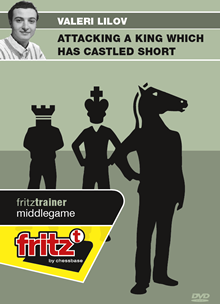 Attacking a King which
has castled short by Valeri Lilov
2012
Attacking a King which
has castled short by Valeri Lilov
2012
http://www.chessbase.com
E-Mail
info@chessbase.com
Euro 27,90
Pentium-Processor at 300 Mhz or higher, 64 MB RAM, Windows XP, Windows
Vista, Windows 7, DVD drive, mouse, soundcard.
Lilov goes in this DVD for the king,this time not for the king
in the centre but for the king who has castled short.
All material is explained and dived in sections as a sacrifice on g7 or
h7,double sacrifices, pawn attacks and so on.
Lilov his material is impressive and these 61 game fragments are good
for 4 hours highly instructive video entertainment.
Going throw these attacking patterns will help you to develop a natural
feeling for attacking.
Just invest some hours of your time and success is insured!
Conclusion: This DVD is really overloaded with attacking tips!
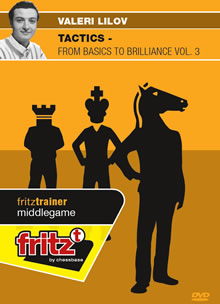
Tactics - From Basics to Brilliance Vol.3 by Valeri
Lilov
2012
http://www.chessbase.com
E-Mail
info@chessbase.com
Euro 27,90
Pentium-Processor at 300 Mhz or higher, 64 MB RAM, Windows XP, Windows
Vista, Windows 7, DVD drive, mouse, soundcard.
There is no better way to learn chess than throw chess exercises
specially these one from Ch
essBase where the experienced coach Valeri Lilov helps you to jump in
no time from one
to the other level.
All material is pleasantly divided into different sections as Knight
Forks, Weaknesses of files and diagonals,Tactical Motifs,Back Rank
Weaknesses etc.
But let us start with a fine example to test your tactical skills:
Running time is 4 hour!
Conclusion: Valeri Lilov really
helps you to improve your tactical skills.
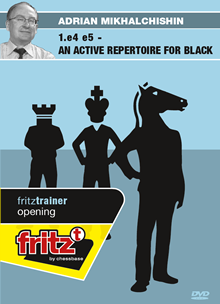
1.e4
e5 - An active Repertoire
for Black by Adrian Mikhalchishin
2012
http://www.chessbase.com
E-Mail
info@chessbase.com
Euro 27,90
Pentium-Processor at 300 Mhz or higher, 64 MB RAM, Windows XP, Windows
Vista, Windows 7, DVD drive, mouse, soundcard.
Grandmaster Adrian
Mikhalchishin provides the user of this DVD a simple but aggressive
openings repertoire based on the move 1.e4 e5.
The main line of this DVD is the good old Spanish where Mikhalchishin
prefers The Smyslov Variation, that runs with the moves:1.e4 e5 2.Nf3
Nc6 3.Bb5 g6.
Originally the move 3….g6 was a invention from Albert Barnes,and it was
used by Steinitz in 1883,but that time it received no mainstream status
till Smyslov did take it up,as we can see in the following model game
from Mikhalchishin: Dueckstein,A (2375) - Smyslov,V (2530) [C60]
Bad
Worishofen, 1991,
1.e4 e5 2.Nf3 Nc6 3.Bb5 g6 4.d4 exd4 5.Nxd4 Bg7 6.Be3 Nf6 7.Nc3 0-0
8.f3 Ne7 9.Nde2 d5 10.exd5 Nfxd5 11.Bg5 c6
12.Nxd5 cxd5 13.c3 Qd6
14.Qd2 Nc6 15.Rd1 Be6 16.Nd4 Nxd4 17.cxd4 Rfc8 18.Be3 Qb6 19.Ba4 Rc4
20.b3 Rc7
21.0-0 Rac8 22.b4 Rc4 23.Rb1 Bxd4 24.Bxd4 Qxd4+ 25.Rf2 Bf5
26.Rd1 Qxd2 27.Rfxd2 Rxb4 28.Bb3 Be6 29.Bxd5 Bxd5 30.Rxd5 Rc2 31.R1d2
Rb1+ 0-1.
But these are more games from
Mikhalchishin on these video files than the ones from Smyslov,and that
insures the
reader one of those super
made grandmaster DVD’s!
One example where our author, even comes on move 12 with a novelty!
Forster,Richard (2459) - Mikhalchishin,Adrian (2535) [C30]
Mitropa Cup 21st Leipzig (1.3), 03.05.2002
1.e4 e5 2.f4 Bc5 3.Nf3 d6 4.Nc3 Nf6 5.Bc4 Nc6 6.d3 Bg4 7.Na4 0-0 8.Nxc5
dxc5 9.0-0 Nh5 10.h3 Bxf3 11.Qxf3 Nxf4 12.Bxf4 Nd4N 13.Bxe5 Nxf3+
14.Rxf3 Kh8 15.Bc3 f6 16.Re1 c6 17.a4 Qd7 18.e5 fxe5 19.Rg3 b5 20.Bb3
Rae8 21.Rxe5 b4 22.Rxe8 Rxe8 23.Rxg7 Qxg7 24.Bxg7+ Kxg7 25.Kf2 Kf6
26.Kf3 Re1 27.Kf4 Rf1+ 28.Ke4 Rg1 29.g4 Rh1 30.g5+ Kxg5 31.Ke5 Rxh3
32.Kd6 Rh6+ 33.Kxc5 Rf6 34.Kxb4 h5 35.d4 h4 36.d5 h3 37.dxc6 Rxc6
38.Bd5 Rxc2 39.b3 Kf4 40.Ka5 Rc5+ 0-1.
As Mikhalchishin wise explains it
is better for a young player to start with 1...e5 than 1...c6 or 1...e6.
Video running time is nearly 7 hours!
Conclusion:
One of those super made
ChessBase grandmaster
DVD’s!









